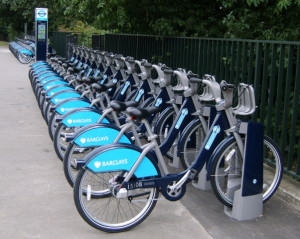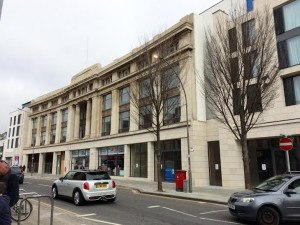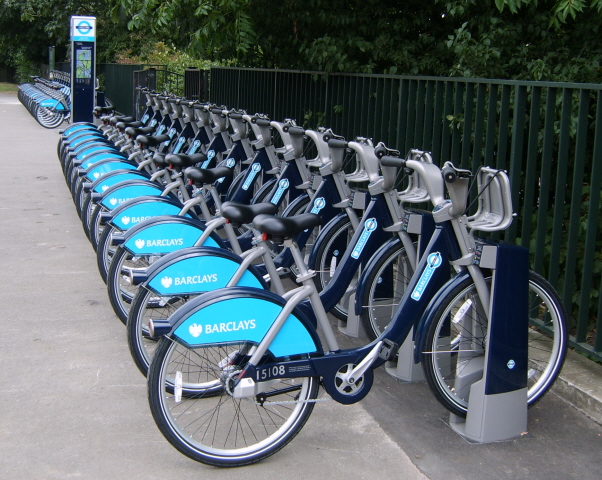A “Boris bikes” scheme for Brighton and Hove looks likely to be given approval in the coming week.
The decision could release £1.5 million in start-up funding for 430 bikes and 50 docking stations initially, although questions remain about the long-term viability of the proposal.
The bike hire scheme would be run along similar lines to the “Boris bikes” scheme in London and is intended in part to support the recent growth in cycling locally.
It comes as a number of significant changes are planned in Brighton over the next few years, including a new layout along Valley Gardens – the area between The Level and the seafront.
New homes and university buildings have been approved in Circus Street – and the old Co-op in London Road has already been converted into student flats. Both Sussex University and Brighton University expect an increase in student numbers.
 Other projects in the pipeline include the main City College campus, in Pelham Street, and the Preston Barracks site, in Lewes Road.
Other projects in the pipeline include the main City College campus, in Pelham Street, and the Preston Barracks site, in Lewes Road.
Work on the i360 is under way. And discussions are taking place about the Brighton Waterfront proposal, which includes extending the Churchill Square shopping centre to the seafront and building a new Brighton Centre at Black Rock.
The “Boris bikes” scheme would employ the equivalent of six full-time staff and cost an estimated £700,000 a year to run.
Brighton and Hove City Council expects to contribute £290,000 to the start-up costs of the scheme.
The council should learn on Wednesday (25 March) whether the Coast to Capital Local Enterprise Partnership (LEP) will chip in £1.16 million.
A report to the Coast to Capital (C2C) Local Transport Body includes details of an independent assessment.
It said: “The promoting authority (Brighton and Hove City Council) claims that the scheme would have a benefit to cost ratio (BCR) of 4.99 to 1.
“If confirmed, this would mean that the scheme was very high value for money as defined by the Department for Transport.
“The independent assessor, Parsons Brinckerhoff, has highlighted a number of risks with the BCR for this proposal
- The number of bikes needed for the scheme is unknown with a wide range of uncertainty. The proposed 430 bikes could be too many or too few.
- The annual operating costs of £700,000 are based on estimates and could be incorrect.
- The business case has not included detailed consideration of the need to redistribute bikes to compensate for ‘tidal’ journeys, ie, when large numbers of people travel to the same destination at the same time, such as a college.
- The assumed number of bike trips of 5.6 trips per bike per day is high for the UK. A 30 per cent decrease in revenue would result in an operating loss of £200,000.
- The predicted operating surplus is reliant on sponsorship revenue of £185,000 which is not yet secured.
- The outturn BCR for the London Barclays Cycle Hire Scheme is 0.7: 1, which would be classified as ‘poor’ by the Department for Transport. This casts doubt on the claimed BCR of 4.99: 1 for the Brighton bike share scheme.
“The Parsons Brinckerhoff reviewer concludes that it would be ‘inadvisable to rely on a high or very high BCR in considering this application’.
“A value of under 1.5 (low or poor) would be more typical of a scheme of this nature.
“The promoting authority disputes this assessment, stating that the assessor has placed too much emphasis on the London scheme.
“They contend that a number of unfavourable outcomes would be needed for a poor BCR, eg, low or no sponsorship, increased costs, lower than expected usage.”
The report also flagged up concerns about “deliverability”. It said: “In general terms, the infrastructure needed for a bike hire scheme is not usually innovative or prone to significant risks.
“However, the independent assessor points out that
- Planning consents for the docking stations have not been achieved.
- The construction and purchase costs could exceed the estimates.
- There could be opposition from existing suppliers or businesses adversely impacted.
- Sponsorship has not been secured.
“Environmental benefits are not substantiated and the business case is not considered to be sufficiently robust or fit for purpose in its current form.
“The benefits claimed for economic growth, socio-distributional impact and contribution to the Strategic Economic Plan included in the business case are acceptable.
“It cannot be readily judged from the business case what the BCR should be without the application of more robust assumptions.
“In the circumstances a conservative conclusion at present would be that the BCR will be low or poor, in keeping with the London Bike Hire scheme.

“This application should be considered on that basis but – in the event that the project is not funded in 2015-16 – the business case should be resubmitted in a more robust form as a future application.”
The LEP report said: “This is an interesting scheme which contains an element of risk.
“The comparison with the London Bike Hire scheme is apt. The London scheme has a poor BCR and does not generate an operating surplus but it also has considerable totemic value.
“It is a highly visual statement of London’s commitment to sustainable transport and cycling.
“By publicising cycling, it could encourage people to use their own bikes more.
“It is possible that the patronage and revenue of the London cycle scheme could improve in future years.”
The LEP report called for more feasibility work to be carried out and said that, even with a poor benefit to cost ratio, it could still be approved.
Funding approval is recommended but the council would be asked to underwrite the scheme. In effect, the council would be asked to subsidise the scheme if it ran at a loss.










The business justification for rental bikes looks extremely dubious; all based upon various optimistic assumptions of usage and sponsorship.
And didn’t dozey Davey run a study that showed they would not work in Brighton sure to all the hills – people would ride them down hills and then the operator would have to keep transporting them back up the hills later.
Having rental bikes for visitors at stations or park-and-ride car parks would be great, but for students to cycle to and from London Road in a vain attempt to justify the Lewes Road traffic jam disaster is criminal.
Yet again another waste of public money to support the green’s clueless plans and their complete lack of business acumen.
Surely this financial outlay would be better invested in saving Preston Park Cycling Track?
if a business took this proposal to a bank to get finance, looking at the independent assessor reports, it would be laughed out the door.. But hey, it’s not real money, it’s taxpayers money……and we do love bicycles in Brighton.
An interesting idea and worth exploring. Perhaps electric bikes should also be considered for hillier parts of the city.
If we can encourage people to leave their cars at home, better still, never feel the need to own a car then that can only be a good thing.
Gerald – hate to disappoint you, old bean, re ‘green’s clueless plans’ (just one green, then) but plans for an imitation ‘Boris’ bike scheme were a key feature of one council manifesto in 2011. That would be the Conservative manifesto. The idea was also taken up by Labour, as I recall.
I asked one of my local Tory candidates how putting private cycle hire companies out of business squared with their commitment to free enterprise – answer came there none.
Ian Davey’s study sounds like a good example of an exercise in evidence-based policy, which is a whole lot better that basing policy on personal prejudices and golf club chatter, which pretty much sums up the approach of the previous Tory administration.